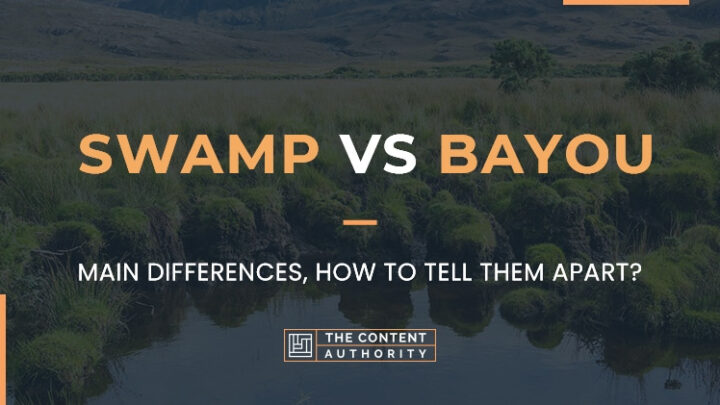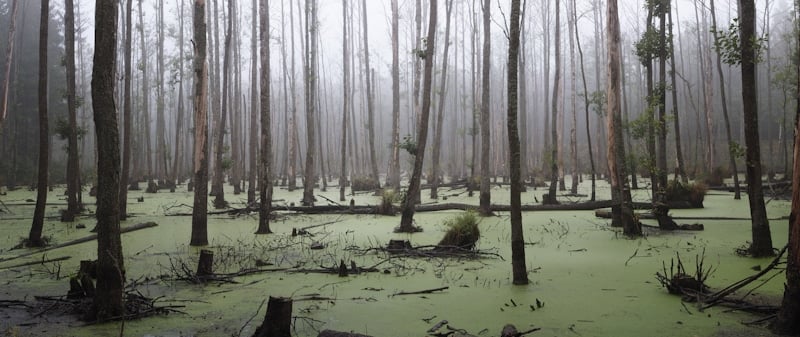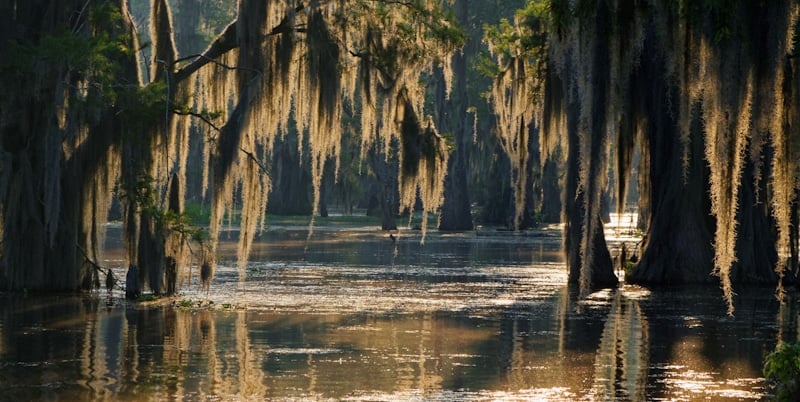Both are humid, both contain water, but they are not the same thing. A swamp and a bayou could be related but not equal. It might not be obvious, but you are not the only one that might be wondering the meaning of each and the difference between these two terms. So, how to tell a swamp apart from a bayou?
What tells a swamp apart from a bayou is the amount of water each has. A swamp is a piece of soggy, mushy land, while a bayou has more water, and it is a river-like water body that tends to have slow-motion current and dirty and smelly water.
Now that you have seen the most essential difference between a swamp and a bayou, you may want to dig a bit deeper into the definitions and characteristics of each, as well as how to use these two terms in a sentence and some good examples of each word.
Definitions
Swamp
A swamp is a wetland that is always submerged in water. Water has covered the plants that grow around the area. The ground is low, and even though there are some types of trees that grow in the area, the land is not suitable for agricultural and pastoral purposes.
Saltwater swamps and freshwater swamps are the two types of wetlands. Trees like cypress, cedar, and mangroves are among the types of trees that can grow in swamps. Scrubs, such as the buttonbush, can be found in swamps as well.
Swamps get their water from groundwater and surface water.
Bayou
A bayou is a tiny, slow-moving stream that runs through lowlands or swamps. It has a sluggish, nearly undetectable current flow in general. They are the muddy outflows of a lake or river. They tend to have a dirty look and an off odor. Bayous can be found everywhere along the Gulf Coast of the United States, particularly in the Mississippi River Delta.
According to legend, the English coined the term “bayou” in Louisiana, and it is supposed to have originated from the Choctaw word “bayuk,” which means “little stream.” The Cajuns were the first to settle on Bayou Teche and other bayous, which is why bayous are connected with Cajun culture. Bayou St. John, for example, feeds into Lake Pontchartrain in New Orleans.
How To Properly Use These Words In A Sentence
If we talk about a swamp, we will be referring to a soft ground submerged in water. But people also use it as a verb to talk about covering a place or thing with a considerable amount of water.
Also, the word “swamp” is used as an idiom to talk about having too much of something or too much to do, more than one can handle. This idiom can be used as a reference to drinking too much alcohol until getting intoxicated.
Swamp is a very flexible word; it can also be used as an adjective to express that something or someone is covered with water or very wet; and most of the time, people will add “y” at the end when using the adjective form, creating the word “swampy.”
When it comes to the use of “bayou,” people tend to talk about slow-moving streams that cross Louisiana. For most residents of Louisiana, these slow-moving streams are known as bayous.
More Great Word Vs Word Posts
List Of Examples of These Words Used In Sentences
Swamp
- The town’s location, which was once a swamp, has been completely drained.
- Cypress trees covered with Spanish moss dominate much of the river’s swamp region.
- The last picture is a vast aquatic wilderness of swamp and woodland, where their system of canals flows insensibly into the sea.
- It was formerly part of an old inland lake or sea that included the current swamp parts of the island’s north, but not the forest’s central valley.
- The swamp behind the temple appears to contain some crudely constructed cages in the water with young crocodiles.
- The redcoats were slaughtered, and their remains were dumped in the desolated swamp on each side of the gangplank.
- There was a big storm coming, and the boat got swamped by a massive wave on our way back.
- With the new technologies, reasonable prices, and great marketing strategies, Chinese mobile phones have swamped the US market.
- It was a tranquil Friday afternoon. I was finishing some reports to hand to my manager, but he thought I was just chilling, so he swamped me with so much unnecessary work.
- In a hospital, you cannot say there is nothing to do; once you say it, the hospital gets swamped with emergency situations and patients.
- After the severe and massive amount of flu cases, insurance companies should expect to get swamped with claims.
- According to what we read, the tourist questioned the child if the swamp in front of him had a hard bottom.
- It was not funny at all. Jake went crazy last night; he tried every drink on the menu and ended up swamped.
- When the change of executive chief in the marketing department, all the employees got swamped by emails of changes in the company’s policies, procedures, and even staff structure.
- In addition to the stretches of swamps along the shore, the eastward-flowing rivers of the Coastal Plain are surrounded by vast swaths of swampland, some of which are densely forested.
Bayou
- Alligators may be found in every bayou, as well as a variety of reptiles such as lizards, turtles, horned toads, moccasins, and rattlesnakes.
- The intentional redirection of the Red River into the bayou has been proven to be highly effective at preventing flooding in Mississippi that this option is being considered to be done again.
- One thing that puts the love and passion for bayou country is trying the fried alligator or alligator soup, two famous dishes around the area.
- My sister wanted to swim in the bayou until my cousin mentioned there were alligators living in the water.
- Last summer, we were staying in a fantastic cabin floating on a bayou in Louisiana.
- It was a culture shock to relocate to the city and away from the slow-paced lifestyle by the water after spending their whole childhood by the bayou.
- There are many “bayous,” a few of which are quite crucial for navigation and drainage.
- Bayous refer to almost all minor watercourses, especially those with slow currents.
- Rice is abundant due to the damp environment and bayous, and it can be found in nearly every Cajun dish.
- The sultry Louisiana bayous that serve as the setting for True Blood’s passionate tale are reflected in the opening lines.
- Many bayous may be improved to become excellent drainage and irrigation canals with a bit of work.
- The wild goose is a more cosmopolitan creature than we are; he eats breakfast in Canada, lunch in Ohio, and spends the night in a southern bayou.
- When she learns that the boys are spending their summer vacation capturing mudbugs on the bayou, she is going to flip.
- When she looked up, she noticed a man across the bayou holding a bulky grocery bag.
- Numerous Louisiana swamp and bayou terrors, many of which are elements of Cajun tradition, are suitable topics for boogie stories.
Wrapping Up The Swamp And The Bayou
In a few words, a swamp is a mushy wet piece of ground; it doesn’t have a lot of water, but there’s enough to soften the surface. Swamps can have some trees growing inside them and usually get their water from groundwater and surface water.
On the other hand, bayous are more similar to rivers, but they have a slow, almost non-existent flow. The water is sometimes dirty and smells funky. Bayous are the habitat of alligators and various species of reptiles such as lizards, turtles, horned toads, moccasins, and rattlesnakes.
These two words are really different. And one must not be used to replace the other.
Shawn Manaher is the founder and CEO of The Content Authority. He’s one part content manager, one part writing ninja organizer, and two parts leader of top content creators. You don’t even want to know what he calls pancakes.



